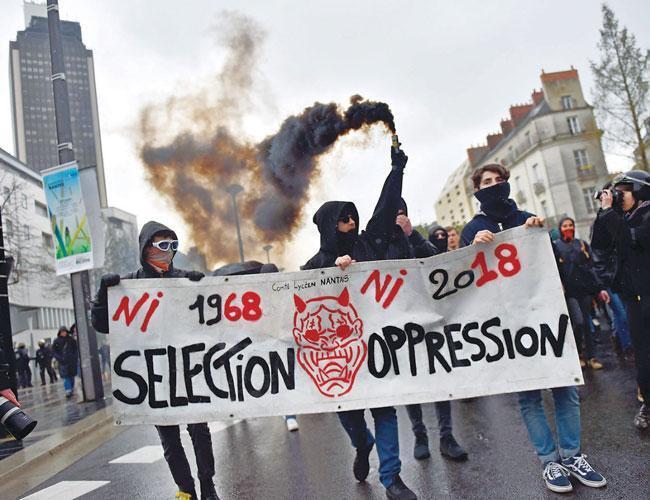
Millions of French commuters and holidaymakers faced another wave of crippling transport stoppages on April 8, as rail workers protested at President Emmanuel Macron’s economic reform plans and some unions warned they could step up strike action.
Train staff last week kicked off three months of nationwide rolling strikes in a dispute over the government’s planned overhaul of state-run rail firm SNCF, in the biggest challenge yet to Macron’s attempts to modernize the French economy.
Just over a third of workers needed to make the train network run smoothly were expected to walk out on April 8, a dip in participation compared to the last 48 hours of walk-outs last week, the SNCF said.
But some labor unions have already signaled a hardening stance as negotiations with ministers over the reforms hit a wall. Officials at the Communist-rooted CGT said on April 6 strikes could drag on well beyond June if nothing shifted.
Laurent Brun, head of the CGT’s railway section, added workers were ready for a “marathon” if needed.
Unions have so far called strikes for two days out of every five until the end of June, to fight a shake-up of monopoly SNCF before it is opened to competition in line with European Union rules.
That includes ending job-for-life guarantees and early retirement for rail workers, which the government argues will help transform the heavily indebted company into a profitable public service.
Workers have hit back with complaints the SNCF was being dismantled to pave the way for a privatization.
The showdown between Macron and the rail unions is one of the toughest tests yet of the former investment banker’s presidency.
The 40-year-old came to power last May on a promise to shake up Europe’s second-biggest economy, in a bid to modernize some of France’s creaking institutions and spur jobs growth, and Macron has so far liberalized labor regulations for instance.
But locking horns with the rail sector has backfired on previous French governments - paralyzing train strikes in 1995 forced prime minister Alain Juppe to pull planned reforms - and unions are seeking to show they still have clout.
Some insisted they did not want a drawn-out conflict but called on Macron’s government to compromise.
“The ball is in the government’s court,” Laurent Berger, head of the CFDT union, told Europe 1 radio on April 7. The CFDT is also joining stoppages called for April 8 and April 9.
The government has so far said it will stand firm on the main points of the reform.
“The status quo is not viable,” Prime Minister Edouard Philippe said in an interview published in Le Parisien newspaper on April 8.
“It’s urgent, we need to advance, and everyone should know we are determined to see this through to the end.”
The SNCF reform has broadly drawn public support so far. Nearly two-thirds of people were in favor of the government facing down the strikes, while 56 percent thought the train stoppages were unjustified, according to an Ifop poll published on Sunday in the Journal du Dimanche.
Yet discontent is also brewing in other sectors.
Students have disrupted several universities across France in protest at a planned new selection system in higher education. Garbage collectors and other public workers have also held demonstrations.